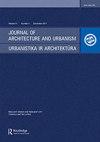INTEGRATIONIST TRIADIC AGENDAS FOR CITY RESEARCH:CASES FROM RECENT URBAN STUDIES
IF 0.8
0 ARCHITECTURE
引用次数: 3
Abstract
With more than 60% of the world population living in urban areas, cities are becoming at the centre of attention in academic institutions and government organizations. However, there appears to be a continuous fragmentation in the types of knowledge developed where issues or concerns are always addressed in isolation and many factors critical to a comprehensive understanding of cities towards creating better urban environments are oversimplified at best or ignored at worst. Therefore, the thrust of this paper is to demonstrate the thought processes involved in instigating frameworks, raising questions, and establishing objectives for responsive city research. It aims to present two triadic agendas that untangle the essential components of city research; the first is the Lefebvrian triadic conception on the production of space and the second is the triadic perspective of lifestyles theories for understanding housing developments, typologies, and choices. Contextually, while the theoretical underpinnings of these agendas are developed based on a body of knowledge generated in the context of the Western world, their conceptualisation is adapted to grasp and examine key unique particularities of selected emerging (and globalised) Arab cities in the Gulf region. Calling for the need for a trans-disciplinary thinking paradigm for city research, the two agendas adopt an integrationist approach that is amenable to understanding the urban realities of these cities.城市研究的整合主义三重议程:来自最近城市研究的案例
世界上60%以上的人口居住在城市地区,城市正成为学术机构和政府组织关注的中心。然而,在发展的知识类型中似乎存在着持续的碎片化,问题或关切始终被孤立地处理,许多对全面了解城市以创造更好的城市环境至关重要的因素往好了说被过度简化了,往坏了说被忽视了。因此,本文的主旨是展示参与构建框架、提出问题和建立响应性城市研究目标的思维过程。它旨在提出两个三位一体的议程,理清城市研究的基本组成部分;第一个是关于空间生产的列非孚三位一体概念,第二个是用于理解住房发展、类型和选择的生活方式理论的三位一体观点。在背景下,虽然这些议程的理论基础是建立在西方世界背景下产生的知识体系的基础上,但它们的概念化是为了把握和研究海湾地区选定的新兴(和全球化)阿拉伯城市的关键独特性。这两个议程呼吁城市研究需要一个跨学科的思维范式,采用了一种整合的方法,可以理解这些城市的城市现实。
本文章由计算机程序翻译,如有差异,请以英文原文为准。
求助全文
约1分钟内获得全文
求助全文
来源期刊

Journal of Architecture and Urbanism
ARCHITECTURE-
CiteScore
1.30
自引率
14.30%
发文量
12
审稿时长
15 weeks
期刊介绍:
The Journal of Architecture and Urbanism publishes original research on all aspects of urban architecture.
 求助内容:
求助内容: 应助结果提醒方式:
应助结果提醒方式:


